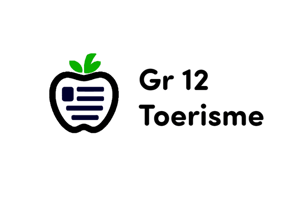Podcast
Questions and Answers
Which component of the tourism and hospitality industry involves short- or long-term accommodation?
Which component of the tourism and hospitality industry involves short- or long-term accommodation?
- Recreation Services
- Travel-related Services
- Food and Beverage Services
- Lodging Services (correct)
Tour operators primarily sell travel packages assembled by other service providers.
Tour operators primarily sell travel packages assembled by other service providers.
False (B)
What is the primary purpose of food and beverage services within the hospitality industry?
What is the primary purpose of food and beverage services within the hospitality industry?
To provide meals and drinks to guests
The Latin word 'hospitare' means 'to receive as a _____.'
The Latin word 'hospitare' means 'to receive as a _____.'
Match the type of lodging with its description:
Match the type of lodging with its description:
What is one example of an institutional setting for food and beverage services?
What is one example of an institutional setting for food and beverage services?
Recreation services include only outdoor activities.
Recreation services include only outdoor activities.
List one common mode of transportation used in tourism.
List one common mode of transportation used in tourism.
According to the 1963 UN Definition, what is the primary distinction between a tourist and an excursionist?
According to the 1963 UN Definition, what is the primary distinction between a tourist and an excursionist?
Domestic tourism refers to travel across international boundaries.
Domestic tourism refers to travel across international boundaries.
What are the four basic elements that define travel?
What are the four basic elements that define travel?
Tourism is often described as __________-intensive, indicating a requirement for significant manpower.
Tourism is often described as __________-intensive, indicating a requirement for significant manpower.
Match the types of tourism with their definitions:
Match the types of tourism with their definitions:
Which of the following describes a characteristic of a tourist product?
Which of the following describes a characteristic of a tourist product?
The impact of tourism is limited to economic benefits only.
The impact of tourism is limited to economic benefits only.
Name two factors essential for the success of a tourist destination.
Name two factors essential for the success of a tourist destination.
Flashcards are hidden until you start studying
Study Notes
Overview of the Tourism and Hospitality Industry
- The tourism and hospitality industries are highly interconnected and often viewed as a single entity.
- Key components include Food and Beverage Services, Lodging Services, Recreation Services, and Travel-related Services.
Food and Beverage Services
- Present in various establishments: hotels, airlines, cruise ships, and malls.
- Types of establishments:
- Commercial Restaurants: Ethnic, fast service, and specialty dining.
- Other Venues: Taverns, bars, food trucks, and vending machines.
- Institutional Settings: Provide food services in schools, hospitals, and shelters.
Lodging Services
- Offers short- or long-term accommodation, often integrated with entertainment.
- Categories of lodging:
- General: Ranges from budget inns to luxury resort hotels.
- Specialized: Includes ski lodges, casino hotels, campgrounds, and health spas.
Recreation and Entertainment
- Original function focused on entertaining guests with food, beverages, and activities.
Transportation
- Essential for travel across various locations.
- Common modes include automobiles, buses, trains, ships, and airplanes.
Travel Agencies and Tour Operators
- Travel Agencies: Create travel packages by aggregating services.
- Tour Operators: Act as wholesalers, establishing contacts with providers (hotels, airlines) to assemble travel packages.
Definitions of Tourism
- Hunziker and Krapf: Defines tourism as travel and stay of nonresidents for leisure or other reasons, without leading to permanent residence.
- Tourism Society in Britain: Emphasizes short-term travel beyond home and workplace.
- Burkart and Medlik: Five characteristics highlight the journey, temporary nature, and non-work related aspects.
Definition of Hospitality
- Originates from the Latin "hospitare," meaning "to receive as a guest."
- Hospitality involves meeting a guest's essentials such as food and lodging.
Meaning of Tourist
- League of Nations (1937): Defines a tourist as someone visiting another country for at least 24 hours for various purposes.
- UN (1963): Differentiates between tourists (24+ hours) and excursionists (less than 24 hours).
Elements of Travel
- Four basic elements include distance (100 miles minimum), length of stay, origin of the traveler, and purpose of travel (e.g., business, recreation).
Types of Tourism
- Domestic: Travel within national borders.
- International: Crosses national boundaries.
- Package Tour: Includes pre-arranged transport and accommodation.
- Independent Tour: Involves separate purchases for travel and lodging.
Characteristics of Tourist Products
- Service-based: Products are intangible and experience-driven.
- Quality and availability can fluctuate; e.g., hotel rooms are fixed in supply.
Tourist Destinations
- Represent geographical units where tourists visit, ranging from villages to nations.
- Factors contributing to success include attractions (natural or man-made), amenities, and accessibility.
Tourist Services Categories
- Include passenger transport, accommodation, entertainment, and food services, facilitated by travel agents and tour operators.
Characteristics of Tourism and Hospitality
- Consumer-centric: Consumers travel to the product.
- Labor-intensive: Requires substantial manpower.
- Seasonal: Fluctuates with vacation periods and seasonal trends.
- Dynamic: Must adapt to evolving customer preferences; multi-dimensional with various interrelated activities.
Importance of Tourism and Hospitality
- Contributes to the balance of payments by generating foreign currency.
- Bridges economic disparities between regions.
- Stimulates overall economic development and provides employment opportunities, especially in labor-surplus countries.
- Promotes cultural exchange and social interaction, leading to mutual respect and appreciation.
Studying That Suits You
Use AI to generate personalized quizzes and flashcards to suit your learning preferences.




